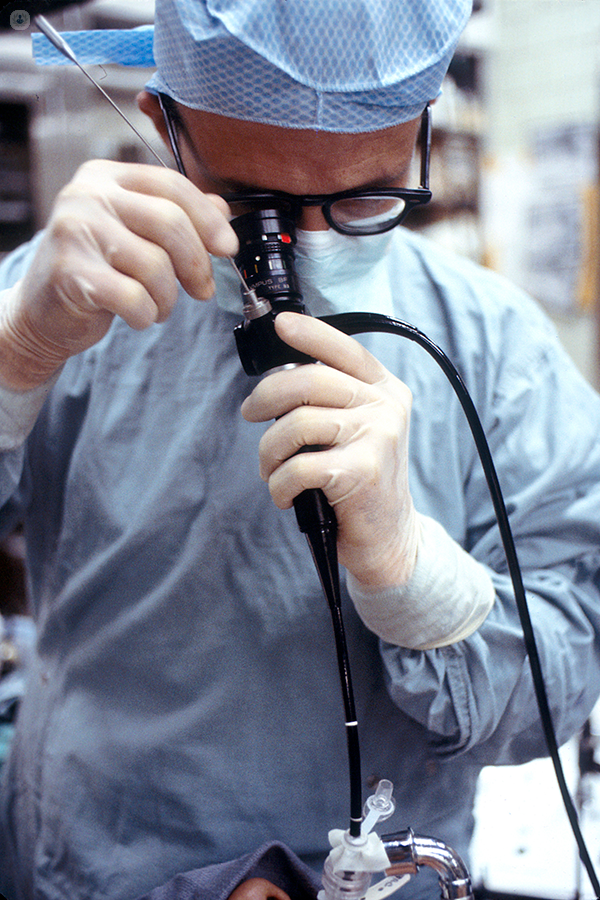Modern lung cancer diagnosis: faster, safer, more accurate
Escrito por:Lung cancer unfortunately is one of the most common causes of cancer in the UK. The good news is that in recent years diagnosing the disease has become much more accurate and straightforward, leading to more effective treatment. Dr Neal Navani, one of London’s top respiratory physicians, is here to explain how the diagnosis process works and what to expect.

Lung cancer: an overview
What are the symptoms?
The most common symptoms of lung cancer are:
- having a cough that often lasts for more than three weeks
- coughing out blood
- feeling breathless while having a severe pain in the chest.
In addition, sometimes patients with lung cancer have a loss of appetite and because of this, can also lose a considerable amount of weight.
It is important to know that it is perfectly possible to have a lung cancer without any symptoms at all.
What causes lung cancer?
In the UK, approximately 85% of cases of lung cancer are directly linked to exposure to tobacco. So smoking is still unfortunately one of the commonest causes of lung cancer.
In addition, exposure to dust such as asbestos and in particularly the gas radon also predisposes to lung cancer.
What we’re increasingly recognizing however is that people who have never smoked or have no obvious exposure to either asbestos or radon are also developing lung cancer, and this proportion of patients who have never smoked in developing lung cancer appears to be increasing.
Diagnosing lung cancer
Initial scans
In the UK, it’s very common for patients to have a CT scan carried down towards their neck, chest and upper abdomen as an initial investigation.
They will then commonly see a respiratory specialist like myself who would take a history from the patient to clarify what their risk factors may be for lung cancer, and importantly to learn about their symptoms and also their wishes as a patient.
We would then as the next step want to carry out a biopsy test. This will tell us:
- whether it is lung cancer
- if it is a lung cancer, what type of lung cancer it may be.
What to expect from the biopsy
The endobronchial ultrasound or EBUS has become a very important procedure for the diagnosis and staging of lung cancer. It is now routinely performed to obtain biopsies on patients in the UK and worldwide for diagnosing lung cancer.
An EBUS is done in an outpatient setting with the patient receiving an injection of a sedative. This means that they are very calm and relaxed but still easily capable of being roused.
The procedure itself is relatively straightforward:
- A spray is usually applied to the back of the throat to make the throat numb and then a small telescope is introduced by the mouth into the lungs. This is not a painful procedure: there is coughing involved but this is mitigated by the operator using local anesthetic.
- Once the telescope is inside the lungs, the operator is able to take an ultrasound probe and have a close look at all lymph nodes within the center of the chest.
- Once they have identified an area that they wish to sample, under direct vision of the ultrasound, they’re able to take biopsies from the lymph nodes within the center of the chest.
The procedure will take typically 30-40 minutes and is generally well-tolerated . The patient would then recover for an hour or two within the hospital unit before being discharged home.
The results from the procedure are generally extremely good – we would expect a positive answer from at least 9 out of 10 procedures. The procedure is also extremely safe and complications are extremely rare.
Completing the diagnosis
We may then want to do a third test which would be a PET CT scan which may help to clarify the extent to which the cancer has spread if at all.
Once we have all of this information together, including the extent to which the cancer has spread, along with the type of cancer we’re dealing with, it’s then important to sit down and discuss the treatment options with the patient.
Is lung cancer curable?
In my clinical practice, far too often I hear that lung cancer is a death sentence. This is very much not the case with modern treatments.
If we’re able to detect lung cancer early enough, we can offer treatments such as surgery and high doses of radiotherapy which have been shown to cure lung cancer in the majority of patients. The key however is detecting the disease at a stage that is early enough for those treatments to be applied.
If you are worried about symptoms of lung cancer, book a consultation with Dr Navani today.


